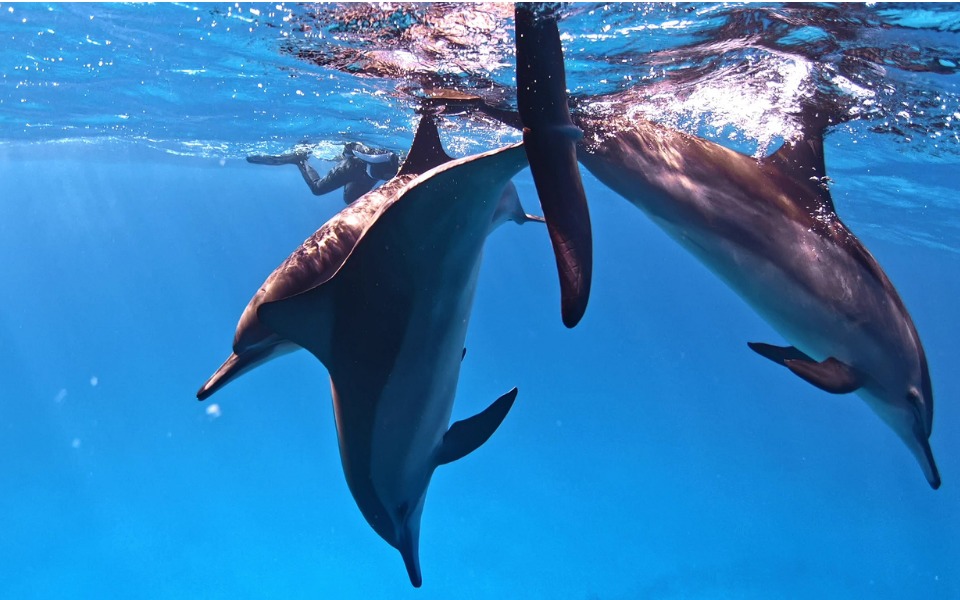
COVID lockdown doesn't help marine mammals; animals stranded near TN coasts
It has always been said that the noise of trawlers and ships caused dolphins, whales and other marine mammals to get stranded near coastal areas, causing the deaths of many.

It has always been said that the noise of trawlers and ships caused dolphins, whales and other marine mammals to get stranded near coastal areas, causing the deaths of many.
The coasts of Tamil Nadu have witnessed many such incidents in the past. In 2016, about 50 short-finned pilot whales were washed ashore in Thoothukudi. In 2017, nearly 40 spotted dolphins were stranded in the same district. Such stranding was reported in 2018 and 2019, too.
In the last five months, however, the Indian seas both on the east and west coasts have been relatively calm as fishermen, their boats and other big vessels have stayed away due to the COVID-19 lockdown. Yet, many coastal districts in Tamil Nadu have continued to witness stranding of marine animals, causing concern among environmentalists.
On April 27, a 10-foot bottlenose dolphin was washed ashore in the Thoothukudi district. In June, an 18-foot-long one-toed sperm whale was stranded in the Ramanathapuram district. On August 30, a 20-metre-long blue whale was stranded in the same district.
Scientists still not sure
According to marine scientists, there are four main reasons why these marine mammals strand on the shores.
“First is when they are hit by boats and ships. They can also get washed ashore due to pollutants accumulated in their body over the years, or, like humans, they too can have bacterial and algae disease attacks. A malfunction of their echolocation mechanism can also cause them to strand,” said E Vivekanandan, former principal scientist and now consultant at Central Marine Fisheries Research Institute (CMFRI), Kochi. “But we don’t have scientifically proven results to show what is causing this.”
There are 27 species of marine mammals recorded in India. Of these, species such as spinner dolphin, humpbacked dolphin, bottlenose dolphin, Risso’s dolphin, common dolphin and pilot whales are the one that are commonly found stranded.
“These mammals live in deep sea waters. Occasionally, they come near the coast in search of food and if they get into shallow water, they get washed ashore. Some species can survive long in the coasts before they are put into water again by humans. Their survival depends on their health also,” said T Balasubramani, former director, Centre for Advanced Studies in Marine Biology, Annamalai University, Cuddalore.
Can’t say there is no sea activity
The sea may look calm superficially, but that doesn’t mean there is no movement of vessels or other developmental activities, he said.
“China is constructing a huge harbour in Sri Lanka. We don’t know what kind of drilling, dredging activities are going on there. That kind of ocean noise also will have an impact on marine mammals,” pointed out Balasubramani.
Stranding incidents have been low during the lockdown, said Chandrasekar, a research scholar at the Centre for Marine Living Resource and Ecology (CMLRE), Kochi. However, that does not mean there is no activity in the sea, he said. “The sea waters of Sri Lanka are on an international route. So, we can’t say there has been no vessel activity in the sea. It is also a marine mammal hotspot region and stranding may happen due to that,” he said.
Need more study
If a marine mammal gets stranded and dies on a shore, its necropsy must be done properly, said Vivekanandan.
“We should collect tissue samples and test. In developed countries, necropsy is carried out in detail. Here, we don’t do a detailed study because we lack the necessary infrastructure. It also needs an expert group, including personnel from fisheries, forests, veterinary departments, etc. Currently, marine mammals come under the purview of the forest department, whose officials lack the expertise to study them,” he said.
Institutions like CMLRE are in the process of developing a more suave ‘Stranding Monitoring System’ to alert officials to stranding events.
“We can also provide helplines. So, if fishermen come across mammals washed ashore alive, they can inform the authorities concerned for immediate action,” said Chandrasekar.
No threat for marine ecosystem
Do such stranding events portend an imbalance in the marine ecosystem? The answer is no, said Chennai-based cetologist RP Kumarran.
“Marine mammals like whales and dolphins need to come out of water frequently for respiration. Sometimes, when they come to the surface for respiratory needs, they get caught in fishing nets. They hurt themselves trying to escape from the net. Such injured mammals usually get washed ashore,” he said. “In India, environmental conservation has an emotional appeal and that is why we worry about such incidents. But, they are quite natural,” said Kumarran, who has been studying marine mammals for more than three decades.
A study carried out between 2002 and 2007 found there were nearly three million dolphins in the Indian Ocean. Even though the stranding incidents happen regularly, there is no threat for the population of the species, say experts.
“Even in countries where dolphins are caught for commercial purposes, it’s not going to cause any immediate threat. In India, they are not caught for commercial use. Dolphins are not sold on the east coast of India, but there is a very limited market for them on the west coast,” said Kumarran.


